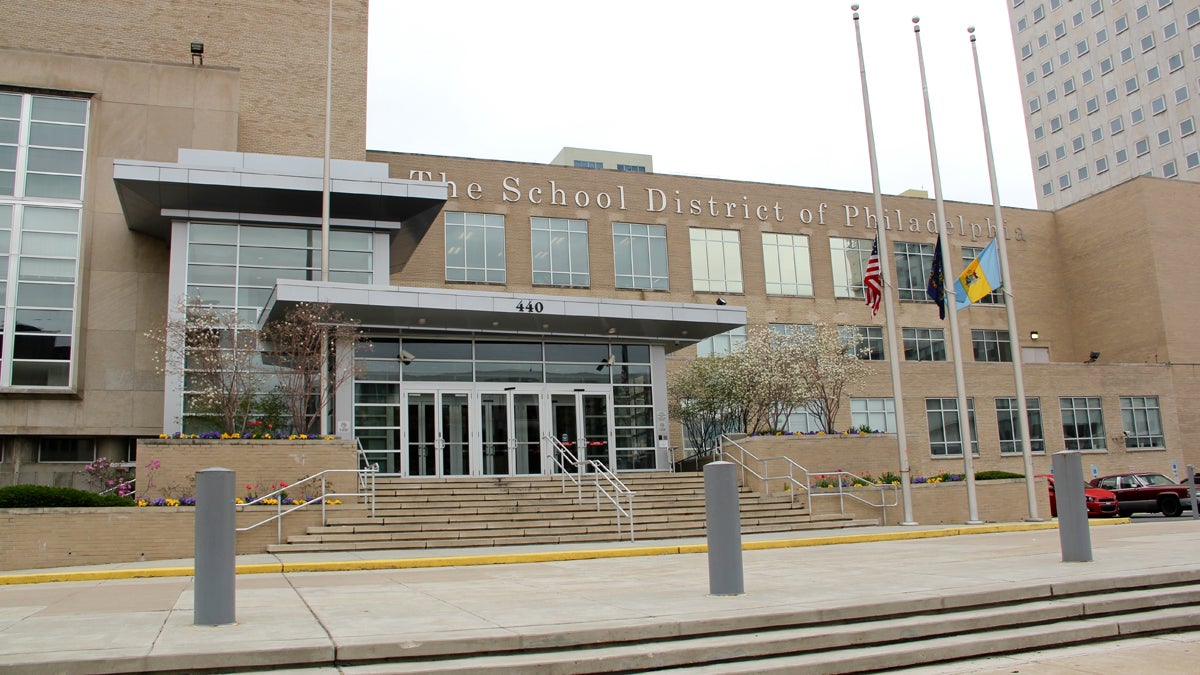Philly SRC adopts budget with surplus, stalls on charters

Philadelphia School District headquarters at Broad and Spring Garden streets. (Emma Lee/for NewsWorks)
Philadelphia’s School Reform Commission adopted a $2.8 billion budget for the upcoming school year on Thursday. Often a fraught endeavor, the adoption proceeded with little fanfare thanks to a rare, if small, budget surplus.
The district projects to be roughly $100 million in the black during fiscal year 2017 as a result of efficiences in areas like energy use and money saved due to its inability to fill all teaching positions. With those extra funds the district has committed to staffing every school with at least one counselor and providing at least one nurse in each building. Other money will go toward updating instructional materials and creating new turnaround schools, including Renaissance charters.
“Today’s School District budget is a win for parents, educators and students who prioritized district-wide school investments that restored basic needs for every child in every school,” read a statement from Councilwoman At-Large Helen Gym, referring specifically to investment in district schools.
In recent years, the school district budget has been subject to intense debate and front-page political squabbling. There was little evidence of acrimony Thursday — but that doesn’t mean the districti’s perenially precarious funding situation has turned around.
In 2013, the district stared down a $304 million dollar deficit. One year later, the SRC refused to pass a so-called “doomsday budget” because it considered the cuts too severe. Gov. Tom Wolf’s prolonged showdown with Republicans in Harrisburg over the current state budget held up the district’s state aid, forcing borrowing and casting doubt on how much money it would receive.
The legislature finally passed a predictable school funding formula this month, but that won’t solve Philadelphia’s problems. Absent any change in projected funding levels, the district will have a deficit again by fiscal year 2019, according to Chief Financial Officer Uri Monson. That budget gap will balloon to nearly $600 million by fiscal year 2021, the district said.
“Our expenditures are growing at twice the rate of our revenues,” said Monson, who called the district’s financial situation “the very definition of a structural imbalance.”
Charter schools are “far and away” the leading contributor to the district’s rising costs, said Monson. Charter costs are expected to grow 8.4 percent in the next five years. Monson attributed the growth to an increase in the number of charter seats as well as a bump in the district’s per-pupil payment to charters. He also cited employee pension obligations as the “second-largest driver” of the district’s expenditure growth for next year.
Monson noted that the district’s current surplus represents just two weeks of operating revenues, or less than five percent of its total obligations. Industry experts and credit agencies recommend government agencies have a fund balance equal to 10 percent of operating revenues, Monson said.
The district’s latest projections are based on the state legislature approving Gov. Wolf’s current budget proposal — a considerable unknown — and on the scheduled expireation of the city’s cigarette tax in 2019. Changes on either front could shift the district’s calculus.
Also pending is the district’s negotiation with the Philadelphia Federation of Teachers, the city’s largest teacher’s union. Thursday was the PFT’s 1000th day without a contract, and several union members gathered to mark the occasion. PFT president Jerry Jordan sent a statement read by his spokesman, George Jackson.
“The educators that are still here are showing amazing dedication to Philly’s children, but they are nearing a breaking point,” said Jackson.
Jordan’s statement pointed to the district’s budget surplus as evidence of its “unwillingness to properly compensate educators.”
SRC member Bill Green, who attended the meeting via conference call, shot back in a statement of his own, noting that other unions have made concessions while the PFT has held firm.
“The PFT was given a choice of agreeing to concessions related to healthcare in order to avoid layoffs or make no concessions,” Green said. “They chose no concessions and to balance its budget in the face of a $300 million deficit the district was forced to lay off thousands of teachers. But the PFT did not really care because laid off teachers can’t vote.”
Though neither combatant was in the room, the showdown between Jordan and Green portended more tough talk ahead on district finances.
Also at Thursday’s meeting, the SRC declined to take action on two Renaissance charter schools despite the district’s recommendations that they be closed.
The SRC voted 3-1 to table nonrenewal resolutions for John B. Stetson Middle School and Olney High School, both in the ASPIRA charter network and both located in North Philadelphia.
The vote means the schools were remain charters until the SRC takes additional action. There’s no timeline for the SRC to take up the issue again, although commissioner Feather Houstoun indicated the SRC plans to vote definitively on the matter at some point.
“We have a lot of documentation, but it is insufficient to make a judgment on the merits of the changes that [ASPIRA is] proposing,” said Houstoun.
The district identified a laundry list of concerns in its recommendation for non-renewal. They included poor academic performance and suspect financial dealings.
The SRC was slated to vote on Stetson’s and Olney’s charters at a meeting last week only to delay action after former city solicitor and mayoral candidate Ken Trujillo testified on ASPIRA’s behalf. Trujillo was also present briefly at Thursday’s meeting, but did not speak.
Last week, the SRC also deferred action on two Renaissance charter schools run by Universal Companies. As in the case of the ASPIRA schools, the district recommended the SRC not renew charters for Universal Vare and Universal Audenried.
Renaissance charters are district schools that have been converted to charters with expectations of a dramatic academic turnaround. Multiple speakers at Thursday’s meeting blasted the SRC for refusing to shutter Renaissance schools that haven’t met expectations.
WHYY is your source for fact-based, in-depth journalism and information. As a nonprofit organization, we rely on financial support from readers like you. Please give today.





